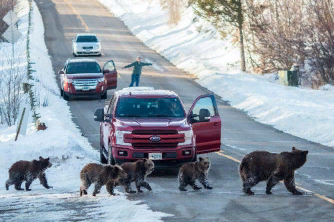Ahmedabad
(Head Office)Address : 506, 3rd EYE THREE (III), Opp. Induben Khakhrawala, Girish Cold Drink Cross Road, CG Road, Navrangpura, Ahmedabad, 380009.
Mobile : 8469231587 / 9586028957
Telephone : 079-40098991
E-mail: dics.upsc@gmail.com

Human-Animal Conflict - The Issue of Man-Animal Conflict in India
News: In response to a series of fatalities resulting from animal attacks and escalating public outrage, Kerala has officially designated the man-animal conflict as a state-specific disaster. This historic move positions Kerala as the inaugural state in the country to take such a decisive step.
Background:
• The escalating interaction between wild animals and humans has become a pressing issue, with detrimental repercussions for both communities and ecosystems. In various states across India, the intensity of human-wildlife conflict has raised significant concerns.
• Take Maharashtra as an example, where the conflict resulted in the tragic loss of 86 lives in 2021 and 105 in 2022. This surge in fatalities starkly contrasts with the previous decade s average of around 40 human deaths. The repercussions extend beyond the immediate human toll, impacting resources, wildlife, and their habitats.
Causes for Man – Animal Conflict
• Growing human and animal populations encroach on established wildlife territories, leading to resource loss.
• Habitat and corridor fragmentation occur due to legal and illegal land use changes like mining clearances and agricultural encroachment.
• Changes in cropping patterns attract wild animals to agricultural areas, exacerbating human-wildlife conflict.
• Habitat destruction results from the spread of invasive alien species.
• Despite having over 700 protected areas in India, 70% of elephant ranges, 40% of lion ranges, and 35% of tiger ranges are outside these protected zones (WWF).
• Case Study - Success Story of Kerala in Managing Man-Animal Conflict Ecologist Madhav Gadgil criticizes the Wildlife Protection Act of 1972, arguing that it enables wild animals to invade human habitations without consequences.
• The optimal foraging theory in ecology, emphasizing that animals aim to maximize nutrient intake while minimizing time, effort, and risks.
Causes for Man – Animal Conflict
• Implementation of robust enforcement mechanisms and pragmatic policies to mitigate and reduce instances of human-animal conflict.
• Active involvement of local communities, aligning with the Future for All Report 2021 (WWF and UNEP), to promote coexistence between humans and wildlife, recognizing the impossibility of complete elimination of such conflicts.
• Conducting awareness campaigns to educate the general public about human-animal conflict, utilizing various forms of media for effective information dissemination.
• Initiation of skill-development programs for communities residing in and around forest areas, aiming to alleviate pressures on both agricultural and forest land.
Case Study - Success Story of Kerala in Managing Man-Animal Conflict
• Kerala, with approximately 5,700 wild elephants (constituting 19% of the nationwide population of 30,000 in 2017), experienced a comparatively lower human toll, with elephants causing 2,036 deaths in India between 2018-2021, and Kerala contributing only 81 (4%) of these fatalities.
• Factors contributing to the control of man-animal conflicts in Kerala include the relatively unchanged boundaries between wilderness and civilization in recent years.
• Changes in agricultural practices, particularly in areas like coffee, pepper, and tea plantations, where elephants have shown little interest, have played a role in mitigating conflicts.
• Naming elephants based on their characteristics is a common practice in Kerala. For instance, Kabali, an elephant residing in the Athirapally jungle in Thrissur district, is known for attacking or chasing automobiles, contributing to local awareness and understanding of individual elephants and their behaviors.
Kerala’s Decision to Declare Man-Animal Conflict as a State-Specific Disaster
• Paradigm Shift: Implications of Declaring Man-Animal Conflict a State-Specific Disaster.
• The current responsibility of managing man-animal conflict lies with the forest department, operating under the guidelines of the Wild Life Protection Act.
• With the decision to declare the issue a state-specific disaster, the responsibility for addressing the conflict shifts to the state disaster management authority.
• The state disaster management authority, empowered by the Disaster Management Act, gains the authority to take faster and more decisive actions in handling the issue.
• Necessitating Action: Considering the Imperative to Make a Decision
• In the aftermath of each human life lost to man-animal conflict, there s a growing demand to tranquilize, capture, or eliminate the responsible animals.
• Currently, the singular authority empowered to make decisions regarding wild animals causing havoc in human settlements is the chief wildlife warden, a solitary position within the state.
• Past instances, such as the decision to tranquilize a lethal animal like a wild elephant, have faced legal scrutiny.
• With the transition to the disaster management authority, this entity gains the ability to take actions that
may override existing norms, including those outlined in the Wildlife Protection Act.
• The Disaster Management Act explicitly stipulates that, except for the Supreme Court or a High Court, no other court holds jurisdiction to entertain suits or proceedings related to actions taken by relevant authorities under this Act.
• Furthermore, the Act asserts its supremacy, stating that its provisions will override any other law during the specific period of a declared disaster.

Address : 506, 3rd EYE THREE (III), Opp. Induben Khakhrawala, Girish Cold Drink Cross Road, CG Road, Navrangpura, Ahmedabad, 380009.
Mobile : 8469231587 / 9586028957
Telephone : 079-40098991
E-mail: dics.upsc@gmail.com
Address: A-306, The Landmark, Urjanagar-1, Opp. Spicy Street, Kudasan – Por Road, Kudasan, Gandhinagar – 382421
Mobile : 9723832444 / 9723932444
E-mail: dics.gnagar@gmail.com
Address: 2nd Floor, 9 Shivali Society, L&T Circle, opp. Ratri Bazar, Karelibaugh, Vadodara, 390018
Mobile : 9725692037 / 9725692054
E-mail: dics.vadodara@gmail.com
Address: 403, Raj Victoria, Opp. Pal Walkway, Near Galaxy Circle, Pal, Surat-394510
Mobile : 8401031583 / 8401031587
E-mail: dics.surat@gmail.com
Address: 303,305 K 158 Complex Above Magson, Sindhubhavan Road Ahmedabad-380059
Mobile : 9974751177 / 8469231587
E-mail: dicssbr@gmail.com
Address: 57/17, 2nd Floor, Old Rajinder Nagar Market, Bada Bazaar Marg, Delhi-60
Mobile : 9104830862 / 9104830865
E-mail: dics.newdelhi@gmail.com